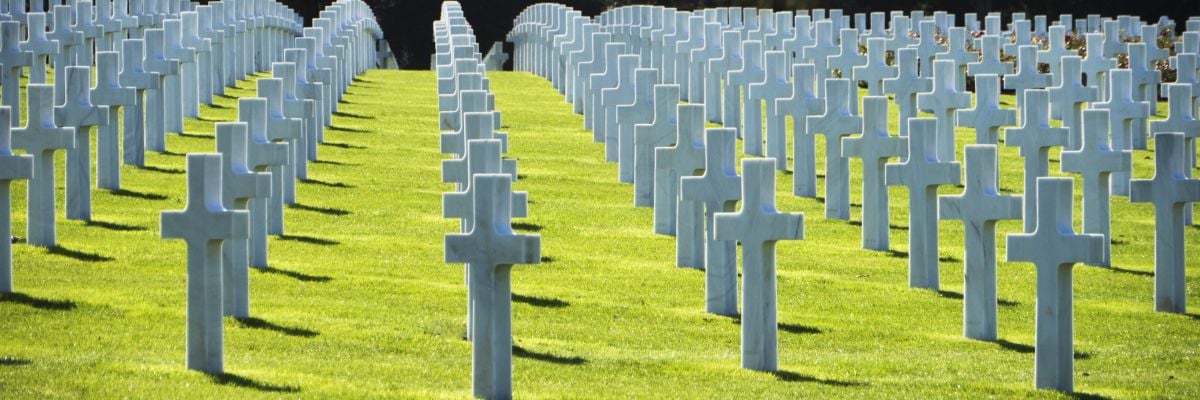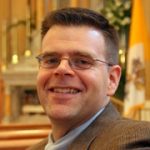
You never know where you’re going to meet a possible future saint: at church, in the grocery store, or strapped to a parachute just a few hundred feet over occupied France, surrounded by a cacophony of roaring engines and exploding anti-aircraft shells.
Seventy-five years ago on June 6, 1944, the “Longest Day” began for some 150,000 Allied troops. Long before the sun rose,13,000 paratroopers from the American 101st and 82nd Airborne Divisions boarded more than 800 transport planes idling noisily on nine separate English airfields. The primary mission of the paratroopers was to secure the inland approaches to the Normandy beaches so that German reinforcements could not harass the assault troops in the amphibious landings. The mission of these elite troops was crucial to the success of the invasion.
Among the thousands of paratroopers who left England on D-Day was Capt. Ignatius Maternowski, a Catholic priest assigned as chaplain to the Eighty-second Airborne’s 508th Parachute Infantry Regiment. Born into a Polish-American family on March 28, 1912, in Holyoke, Massachusetts, Ignatius spent his elementary school years at the Mater Dolorosa parish school. He attended high school in Athol Springs, New York, a small town south of Buffalo near Lake Ontario. While at St. Francis High School, Ignatius was impressed with the Conventual Franciscan friars he met and discerned a religious vocation.
Upon graduation in 1931, Ignatius entered the order. He was sent to the St. Joseph Cupertino Novitiate in Ellicott City, Maryland, where he took his simple vows in the summer of 1932. Recognizing his intellectual acumen, the order sent Br. Ignatius to St. Hyacinth College and Seminary in Granby, Massachusetts, for further studies and preparation for ordination to the priesthood. Br. Ignatius became Fr. Ignatius when Bishop Thomas O’Leary ordained him in the summer of 1938.
Assigned as a parochial vicar at Corpus Christi parish in Buffalo, Fr. Ignatius became known for his preaching before returning to Ellicott City, where for three years he conducted retreats and parish missions at the Friary of St. Anthony of Padua.
The attack on Pearl Harbor in December 1941 brought the United States into a war that had been raging for three years. Germany had occupied most of Western Europe and was threatening to conquer the Soviet Union, while Japanese forces achieved stunning victories in the Pacific. The U.S. war effort ramped up, building a military force that could defeat the Axis powers.
As a patriot, Fr. Maternowski desired to serve his country, and as a priest, he desired to minister to the nation’s warriors. After receiving permission from his superior, he joined the U.S. Army in 1942 and volunteered to become a paratrooper. Fr. Maternowski earned his jump wings and was assigned to the 508th Parachute Infantry Regiment, the “Red Devils” of the Eighty-second Airborne Division.
As a military chaplain, Fr. Maternowski was known as a strong and lively man who was well-liked by his fellow troopers. Although warriors can tend toward rough and coarse activities and language, Chaplain Maternowski did not tolerate such behavior and challenged men to a boxing match if they made inappropriate comments about the Church and especially the sacrament of confession!
The 508th boarded transport for Europe in late December 1943 and arrived in Ireland in early January before being transferred to England, where they spent the next five months training and preparing for their combat jump into German-occupied France. The Eighty-second Airborne’s mission on D-Day was to capture the town of Ste. Mère-Église, a vital town in the Cotentin peninsula near Utah Beach, and to capture bridges and establish bridgeheads along the Douve River.
Before embarking on their transport planes, Fr. Maternowski celebrated Mass and granted general absolution to the paratroopers. As the 508th neared the drop zone on D-Day, the aircraft encountered heavy anti-aircraft fire, and the pathfinders (paratroopers dropped before the main force to mark the drop zones for the incoming aircraft) were thwarted by enemy forces. As a result, the transport planes overshot the drop zones and scattered the paratroopers throughout the swamplands near the river.
Chaplain Maternowski landed with a group of paratroopers near the town of Picauville (about five miles west of Ste. Mère-Église) in the hamlet of Gueutteville. A company of German infantry occupied the town in April 1944 and engaged the American forces.
Soon after landing, Fr. Maternowski discovered a crashed American glider near the town with multiple wounded troopers. Along with a medic, Fr. Maternowski gathered all the wounded they could find and brought them to the hamlet’s café-grocery store owned by Jules Thouroude. Amidst the still-raging battle, however, the small aid station was quickly overwhelmed.
Chaplain Maternowski came up with a heroic and dangerous plan: to cross into German territory and suggest that the enemy forces create a combined aid station in a house at the end of the village to minister to wounded soldiers from both sides. Despite protestations against his idea, Fr. Maternowski, according to eyewitness Louis Marion (then a seventeen-year-old boy), walked to the German positions with his helmet attached to his belt. Surprisingly, a German medical officer listened to his plan and agreed to walk back with the priest to assess the situation.
Verifying the accuracy of Fr. Maternowski’s report, the German medic indicated he needed to return to his own lines. Fr. Maternowski decided to escort the German officer. After seeing the medic safely back to German positions, the priest began his walk back to American positions.
Although helmetless and wearing a white Red Cross armband and his chaplain’s insignia, Fr. Maternowski was shot dead by a German sniper. He was the only U.S. military chaplain killed on D-Day (and one of twenty-five Catholic chaplains to die in the Second World War). Due to German resistance in the area, it was several days before American soldiers from the 90th Infantry Division recovered Fr. Maternowski’s body and buried it on Utah Beach. Several years later his remains were returned to the United States and reinterred at the Conventual Franciscan Friar Cemetery in South Hadley, Massachusetts.
The men of the 508th Parachute Infantry Regiment suffered greatly during the Normandy campaign. The unit fought German forces for thirty-three days and suffered a 52 percent casualty rate (killed, wounded, and missing in action). Among those killed was their beloved Catholic chaplain, Fr. Ignatius Maternowski, who clearly illustrated his devotion and service to others in his final day of life on Earth.
Although not well-known even among Catholics, Fr. Maternowski’s sacrifice remains in the minds of the people of Gueutteville, who erected a memorial to him. The Franciscan Friars (Conventual) of the Our Lady of Angels Province has opened his cause of canonization.



